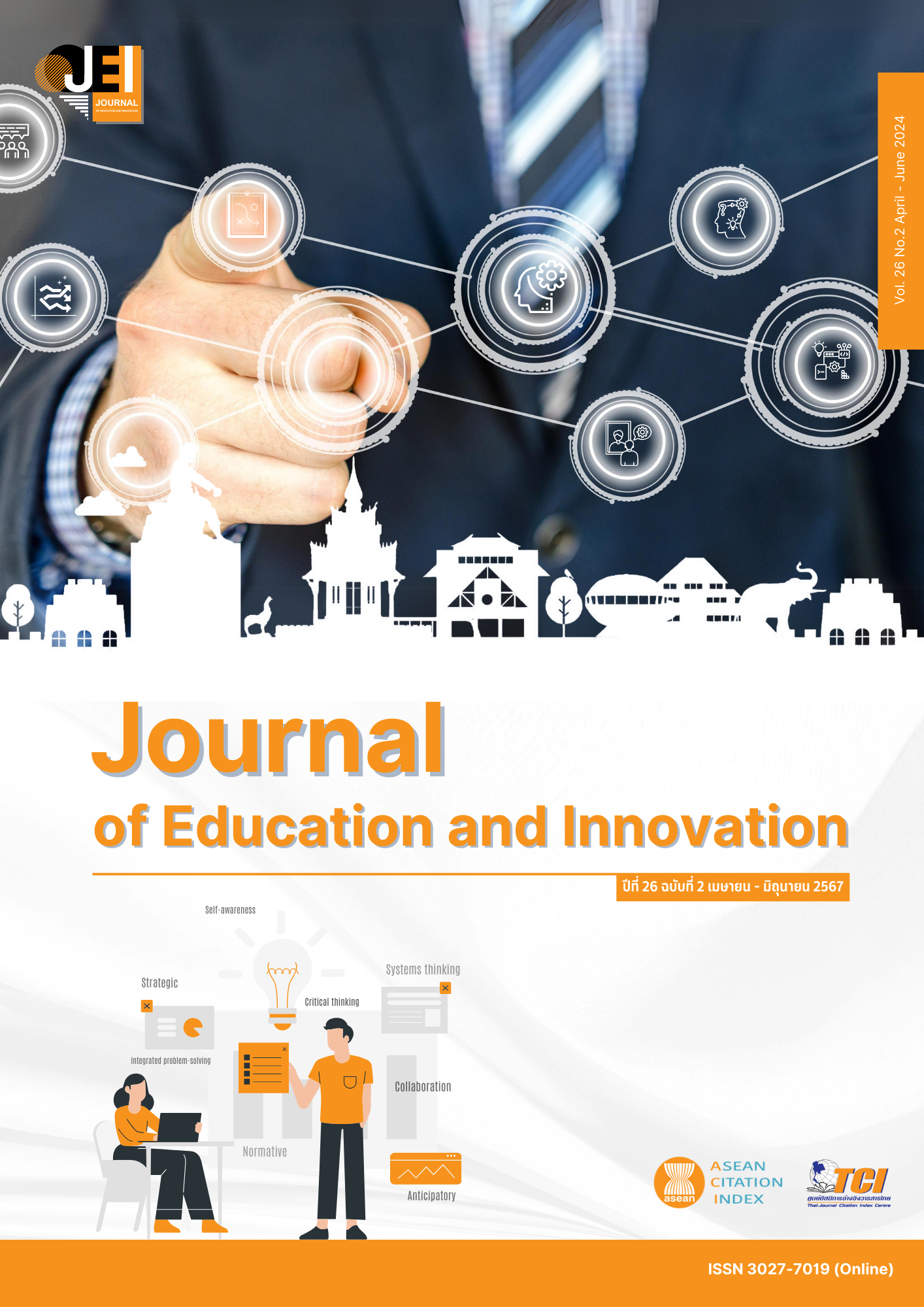COMPETENCIES OF INDUSTRIAL MENTOR IN WORK-INTEGRATED LEARNING FOR BACHELOR DEGREE OF INDUSTRIAL TECHNOLOGY PROGRAM
Main Article Content
Abstract
This research aimed to develop the competency standard of industrial mentors in work-integrated learning (WiL) and developed a tool to assess the competency standards of industry mentors. The research was carried out as follows: Phase 1: Developing the competency standards of industrial mentors in work-integrated learning using functional analysis techniques conducted a focus group discussion with 22 experts providing information. Phase 2: Establishment of a tool for evaluating industry mentors' competency standards conducted a focus group discussion to synthesize data and prepare a competency assessment tool from 22 experts. Then use the competency assessment tools, including multiple choice exams, interview exams, and portfolio questions for 5 experts to check for consistency between questionnaires and objectives or contents to be measured in each type of assessment tool, and bring the assessment tools to trial with employees assigned as mentors of undergraduate students in work-integrated learning of 60 people with selective selection. The results showed that industrial mentors were divided into 2 levels. The industrial mentors at both levels have the same key functions, namely, management of learning to develop learners’ competency in accordance with the learning outcomes of the curriculum/establishment. For industrial mentor level 2, there are more key functions, including measuring and evaluating learners' learning outcomes in accordance with the learning outcomes of the course/establishment. A tool for evaluating the competency of industry mentors is 20 multiple-choice questions, 5 interview questions, and 1 portfolio.
Article Details

This work is licensed under a Creative Commons Attribution-NonCommercial-NoDerivatives 4.0 International License.
The owner of the article does not copy or violate any of its copyright. If any copyright infringement occurs or prosecution, in any case, the Editorial Board is not involved in all the rights to the owner of the article to be performed.
References
Abby, M. M. (2007). Mentoring as a Knowledge Management Tool in Organisations (Master thesis). Stellenbosch: Stellenbosch University.
Akyildiz, S. T., & Ahmed, K. H. (2021). An overview of qualitative research and focus group discussion. International Journal of Academic Research in Education, 7(1), 1-15.
SALTO Training & Cooperation Resource Centre. (2020). A set of competences for Trainers working at international level. Bonn, Germany: SALTO Training & Cooperation Resource Centre.
Boonsri, S., Tangdhanakanond, K., & Kanjanawase, S. (2020). An assessment of multidimensional knowledge competency of vocational technical teachers in technical education students. Journal of Education Studies, 48(3), 349-369.
Eble, R. L., & Frisbie, D. A. (1986). Essential of Educational Measurement (4th ed.). New Jersey: Prentice-Hill.
Gilbert, J. (2021). Mentoring in a cooperative learning classroom. International Journal for the Scholarship of Teaching & Learning, 15(2), 1–7.
Hinkle, D. E., Wiersma, W., & Jurs, S. G. (1988). Applied statistics for the behavioral sciences (2nd ed.). Boston: Houghton Mifflin.
Jackson, D. (2017). Developing pre-professional identity in undergraduates through work-integrated learning. Higher Education, 74, 833–853.
Jackson, D., & Rowe, A. (2023). Impact of work-integrated learning and co-curricular activities on graduate labor force outcomes. Studies in Higher Education, 48(3), 490-506.
Jindarak, P. (2017). Competency development for academic staff in high education. Journal of Graduate Studies Valaya Alongkron Rajabhat University, 11(1), 221-233.
McClelland., D. C. (1973). Testing for competence rather than for intelligence. American Psychologist, 1-14.
Network for The Development of Cooperative Education in The Upper Southern Region. (2018). A manual for work-integrated learning teaching. Bangkok: Office of The Higher Education Commission.
Keerariwuntakorn P., Joochim, C., Saneeyeng, T., & Petcharuk, R. (2017). The development of skilled workers in industry by developing in-house trainers according to German standards. Journal of Technical Education Development, 29(102), 3-12.
Komuthanon, A., & Seel, F. (2020). Implementing the standard for In-company trainers in ASEAN countries (ASEAN In-CT Standard) Deutsche. Bonn, Germany: Gesellschaft für.
Kramer, M. A. (2011). Work-integrated learning and career-ready students: Examining the evidence. Toronto: Higher Education Strategy Associates.
Moraray, T., Stirayakorn, P., & Methapatara, P. (2017). The development model of integrated training course for coaching competency development of trainers in workplaces. Technical Education Journal King Mongkut’s University of Technology North Bangkok, 8(2), 247-255.
Office of The Education Council. (2017). National qualifications framework revised edition. Bangkok: Prikwarn Graphic.
Office of the Higher Education Commission. (2018). 20 Year Long Term Higher Education Plan (B.E.2561-2580). Bangkok: Office of Higher Education Policy and Planning.
Pipitkun, K. (2018). Quality of questionnaire tools: Validity and reliability in public administration for research. Academic and Research Journals Northeastern University, 8(2), 104-110.
Prajugjit, M., & Kaewkuekool, S. (2020). Development of trainer competency model: A case study at Thailand's Department of Skill Development. International Journal of Innovation and Learning, 28(2), 206-238.
Ritcharoon P. (2021). Techniques for measuring and evaluating learning outcomes. Bangkok: Petchkasem Printing.
Sarnrattana, U., (2016). Synthesis study for global competency. Journal of Education Khon Kaen University, 39(9), 1-13.
Senate Education Committee. (2020). Education management by work-integrated learning for vocational education with an emphasis on bilateral model. Bangkok: The Secretariat of the Senate.
Stirling A., K. G. (2016). A practical guide for work-integrated learning. Canada: Higher Education Quality Council of Ontario.
Suradom, K., & Chaloeyjanya, K. (2016). Development of standards for trainers in the workplace. Journal of Technical Education Development, 29(100), 3-12.
Wang, J., Gill, C., & Lee, K.H. (2023). Effective mentoring in a work-integrated learning (WIL) program. Journal of Teaching in Travel & Tourism, 23(1), 20-38.
Zachary, L. J. (2011). The Mentor’s guide: Facilitating effecting learning relationships. New Jersey: John Wiley & Sons.


